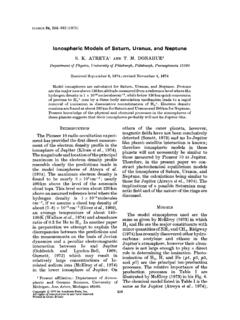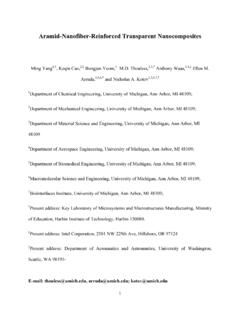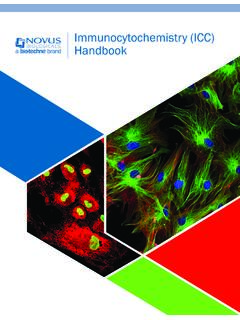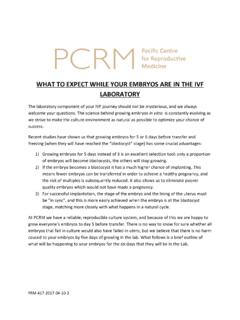Transcription of The Concept of Patient Autonomy - University of Michigan
1 This essay appeared in two parts in the journal, Medical Updates, a publication of the American International Health Council. Medical Updates was published primarily for health care professionals in the Middle East. (It stopped publishing a few years ago.) Like all articles in the journal, it appeared in both English and in Arabic translation. (I hope the Arabic translation is accurate!--EB) The Concept of Patient Autonomy Elias Baumgarten Part I: The Importance of Patient Autonomy If there is one Concept at the center of the bioethics movement, it is Autonomy . The notion that patients have a moral claim to direct the course of their own medical care and to be given reasonably full information in order to make medical decisions is the most significant challenge of the bioethics movement to conventional medicine. In the United States and elsewhere, this idea has transformed the doctor- Patient relationship.
2 Just to take one example: in 1961, eighty-eight percent of physicians would not tell patients of a cancer diagnosis1; today an overwhelming majority of American physicians feel obliged to disclose that information. Recently, however, there has been a reassessment of the importance of Patient Autonomy . Some are suggesting that the focus on Autonomy is a distinctively American phenomenon, a reflection of American culture s unusual diversity and its obsession with individualism. Historically the emphasis on Autonomy in the United States does coincide with a period of increasing skepticism about authority in general, especially male authority, and a time of greater receptivity to the voices of people who had not previously been in the mainstream of the medical profession; in particular, women, African Americans, Hispanics, and other minorities.
3 These developments reinforced an American tendency to challenge physicians authority to make medical decisions for their patients. It is reasonable to ask whether the Concept of Patient Autonomy should play such an important role in other societies, especially those with more cohesive and widely accepted traditions. I would argue that Patient Autonomy is much more than just an idiosyncratic American (or Western) cultural trend. The moral force of Patient Autonomy , far from being a culturally specific notion, is based on the nature of medical decisions and on respect for the dignity of persons. 1 Donald Oken, What to Tell Cancer Patients, Journal of the American Medical Association 175 (April 1, 1961): 1120-1128 The Concept of Autonomy page 2 Every medical decision includes both a scientific and an ethical component, but the special expertise of physicians is limited to the area of medical science.
4 For example, a physician s training equips him or her to determine the genetic risks a couple may face in having children. But medical training cannot address the ethical question of whether these risks imply that a couple should refrain from reproduction. Medical decisions include a value dimension often requiring that medical benefits (such as continued life and health) be weighed against not only medical risks but non-medical values as well. That more invasive surgery decreases the risk of cancer recurrence by 3% compared to less invasive surgery is a medical judgment, but whether that benefit is worth tolerating the cosmetic and other effects of the surgery is not a question for medical science. The importance of non-medical values is even more obvious for a Patient who has religious objections to certain forms of medical treatment; for example a Muslim woman who interprets Islam as forbidding treatment by male physicians.
5 These considerations argue against older forms of medical paternalism, where physicians restricted the freedom of their patients on the grounds that doing so was for the patients own good. However sincere a physician s motivation, it is hard to see why the ethical values that guide medical treatment should differ, as they so often once did, only from physician to physician rather than from Patient to Patient . What the bioethics movement got right in emphasizing Patient Autonomy was the idea that a Patient s ethical values, not the physician s ethical values, should control medical treatment. There are other good reasons for respecting the Autonomy of patients. Patients who are informed about their condition and who understand the reasons for a course of treatment are more likely to follow its prescriptions. Even when a physician must impart news of a bleak prognosis, honestly informing patients gives them an opportunity to put their affairs in order, to reflect on their life as a whole, and to take the practical and spiritual measures that perhaps they alone know to be necessary.
6 Moreover, if physicians establish a practice of withholding bad news from patients, patients will be less likely to trust the reassurances of physicians when the news is not bad. Nonetheless, many criticize this emphasis on Patient Autonomy and claim that a physician s first obligation is simply to do what is best for his patients. To offer full information and allow patients to make crucial decisions could lead many patients to make unwise choices. Obviously the moral claim of Autonomy does not apply to young children, the severely mentally incapacitated, or patients who are otherwise incompetent and unable to exercise Autonomy . But the critic of Autonomy insists that even many patients who are technically competent would make irrational and unwise choices if physicians do not make medical decisions for them. For example, a Patient who is informed of the potentially unpleasant or harmful side effects of treatment may refuse what a physician knows to be beneficial therapy.
7 The problem with this objection is that it offers no reason why persons should be treated as needing protection from their irrational and unwise choices once they find themselves within the medical system and yet are thought entitled to make free choices about their own lives outside the medical sphere. It is basic to the dignity of human beings that they be afforded the opportunity to make choices about their own lives. Outside the medical setting persons face decisions every bit as important as those of patients: the choice of a marriage partner; the The Concept of Autonomy page 3 selection of a career; the ongoing choice of what emphasis to give to the pursuit of competing materialistic, aesthetic, ethical, and spiritual goals; even the potentially life-and-death choice of whether to see a physician in the first place. Given the frailty of human nature, even competent adults sometimes fail to make the best choices in all of these areas.
8 If we nonetheless deem it a matter of basic human dignity to respect the freedom of people to make their own decisions in areas where primarily their own welfare is at stake, then the burden of proof is on those who would deny that freedom to people when they become medical patients. Part 2: The Problems with Patient Autonomy An established principle of medical ethics is that patients have a moral claim to Autonomy . This is sometimes conceived as a moral right for patients to be informed about and to control their own medical treatment. To the extent that patients have a moral claim to Autonomy , physicians have an ethical obligation to impart full information to patients and to respect the decisions that they make about their own health care. As discussed in the last issue of Medical Updates, I regard Patient Autonomy as not merely an American or Western cultural value but as an ethical principle that is basic to human dignity.
9 Nonetheless, we should not regard the obligation to respect Autonomy as absolute. Nor should we think that it requires that we do whatever patients say they want. I will discuss three challenges to the idea of Patient Autonomy : (1) the obligation to respect the values of the medical profession; (2) the duty to consider the important role of families; and (3) the duty to distinguish between a Patient s current choices and that Patient s own genuine wishes. The first two challenges suggest competing values that may outweigh the value of individual Autonomy while the third challenge warns against an oversimplified view of the Concept of Autonomy itself. Taken together, these challenges do not negate the moral value of Patient Autonomy but enrich our understanding of it and place the duty to respect Patient Autonomy in the larger context of a physician s moral obligations.
10 First, physicians have a moral obligation to the medical profession that may outweigh their duty to respect a Patient s wishes. One kind of Patient request that may be thought to violate the values of the medical profession, discussed in a previous issue of this journal, is a request to be helped to Many would argue that a Patient s right of Autonomy does not extend to assistance in dying. But requests from patients that conflict with values of the medical profession are not limited to requests for assistance in dying. Physicians are members of a profession with its own inherent values, and it would be a mistake for them to view themselves, in a business model, simply as providers of services to a client. An extreme example, just to make the point, would be a Patient who offers to pay a physician to have his arms amputated, though there is no good medical reason for the procedure.















